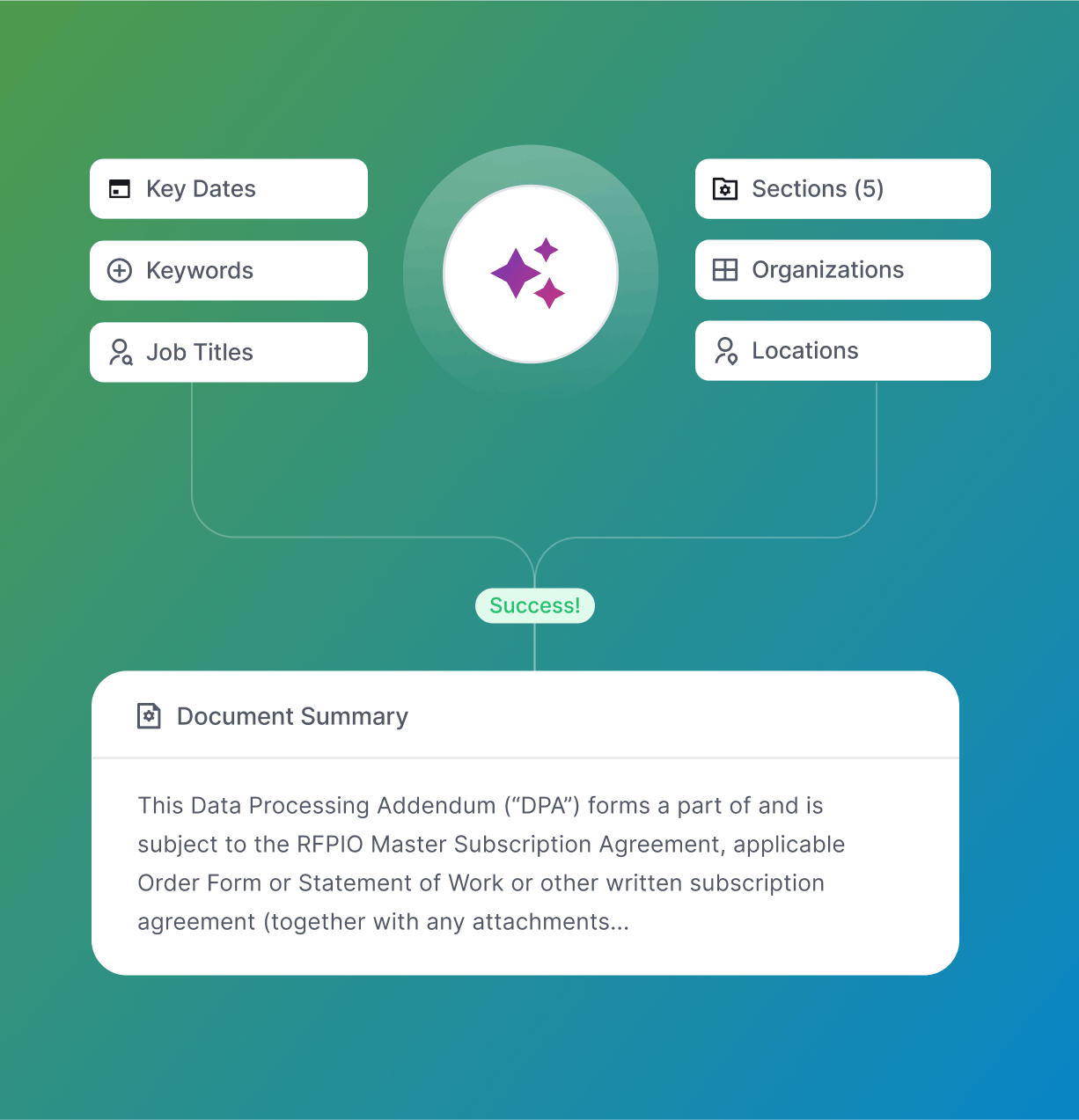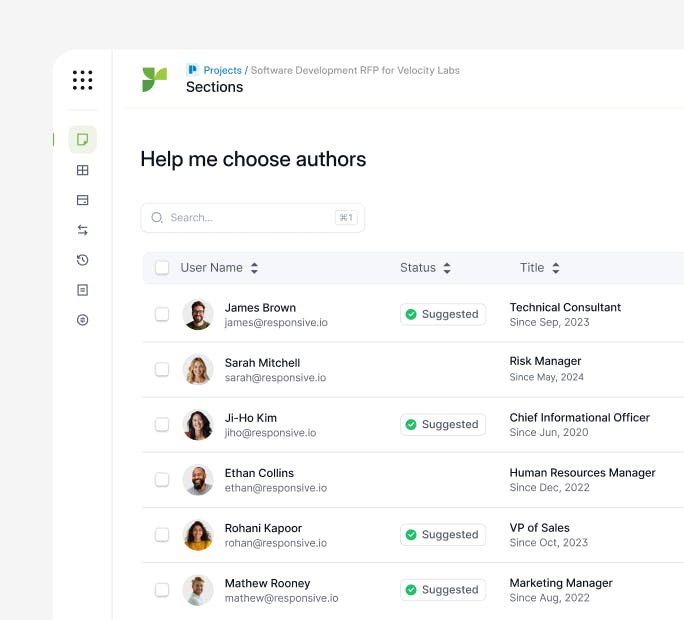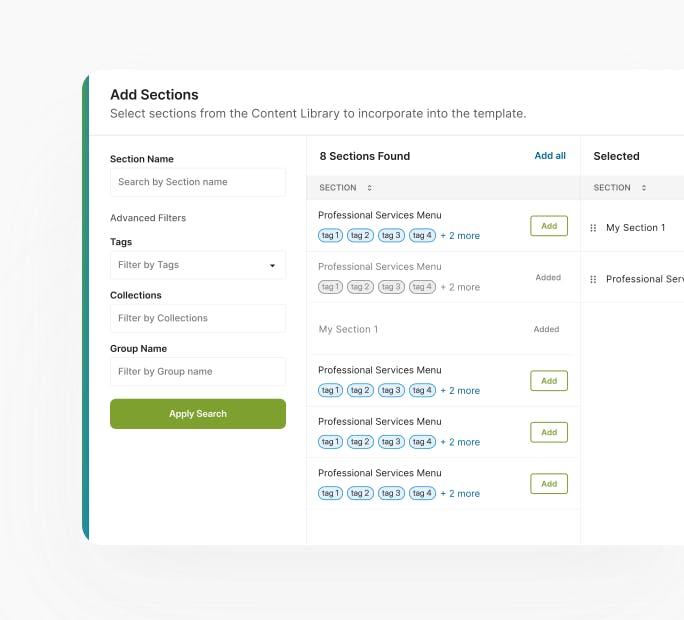AI proposal writing has become increasingly common across teams managing RFPs, security questionnaires, due diligence requests, and more. You're probably here because you want to understand how these tools work, what they can and can't do, and how your team might benefit from adopting them.
Whether you're in sales or proposal management, learning how AI fits into your workflows can help you approach each proposal with greater confidence and clarity.
This post covers the key components of AI proposal writing, how different technologies come into play, and where they still rely on human insight. We’ll also take a look at concrete use cases and explore how the Responsive platform supports teams working in tech, finance, healthcare, and many other complex industries.
If you're evaluating options or refining your current processes, you've come to the right place.
AI’s impact on proposal writing
Proposal writing used to be almost entirely manual. Teams juggled spreadsheets, emails, Word docs, and shared drives, often without a consistent process or up-to-date content library. The result was time-consuming, redundant, and often stressful for subject matter experts (SMEs), proposal managers, and sales teams. Now, with AI, much of that friction is being removed.
AI technologies are actively changing how proposals are created. By automatically analyzing request documents, suggesting relevant content, and even generating draft responses, AI tools reduce the time spent on repetitive tasks. Instead of copying and pasting answers from past proposals or tracking down the right SME, AI can surface relevant content in seconds.
The shift is significant. According to Gartner, organizations that adopt AI-driven content generation report a measurable reduction in turnaround times and improved content consistency.
Some of the most immediate advantages of using AI in proposal creation include accuracy, efficiency, and consistency. AI helps ensure that responses reflect the latest approved language, cutting down on the risk of outdated or inaccurate information. Automation also speeds up the review process and allows SMEs to focus only on content that truly needs their input.
These improvements can lead to higher-quality proposals, reduced burnout, and stronger collaboration across teams.

How proposal writing tools use AI behind the scenes
Understanding how AI-powered proposal tools operate helps clarify where they can improve your process. These tools are built on a foundation of natural language processing (NLP), machine learning (ML), and generative AI (GenAI) with each component playing a distinct role in automating the workflow and supporting your team.
Natural language processing for analyzing and shredding RFPs
NLP enables AI tools to interpret the intent and structure of incoming requests. When a new RFP arrives, for example, the AI "shreds" the document — breaking it into sections, questions, and requirements — so it can be matched with relevant content from your Content Library. This automation accelerates early-stage proposal preparation by eliminating the need to manually dissect the document line by line.
By understanding contextual cues, NLP allows teams to avoid misinterpretations and better align responses with the ask. It also improves accuracy in search, making it easier to retrieve content that matches even loosely phrased questions. This is particularly useful for companies that respond to a high volume of requests across various formats and terminology sets.
Machine learning for smart content suggestions
Machine learning (ML) allows AI tools to adapt to your organization's preferences over time. These systems learn from past proposals, user selections, and content performance to surface more accurate suggestions in the future. For example, if your team regularly selects a particular answer to a common security question, the AI will recognize this pattern and prioritize that version.
ML-based features help eliminate content drift and maintain consistency across teams. They also support smarter tagging and classification of content within your Content Library, improving long-term searchability and reducing duplicate entries. This gives proposal managers a clearer view into how content is used and when updates are needed.
Generative AI for drafting content
Generative AI is what enables tools to produce human-like content automatically. It can create a full draft of an RFP response, summarize complex documents, or suggest edits for clarity and tone. Generative models are trained on vast datasets to mimic the style and structure of effective proposals.
This capability is particularly valuable when teams face tight deadlines or don't have a first draft to build from. Generative AI can accelerate the initial writing phase so that SMEs and reviewers can focus on refinement. When integrated into platforms like Responsive, generative AI works alongside your approved content, ensuring outputs stay aligned with brand and compliance guidelines.
What AI can’t do for proposals

Even the most sophisticated AI proposal tools require human judgment. While they reduce repetitive tasks, they don't fully understand company strategy, client nuances, or legal implications. It's important to view AI as a co-author, not a replacement.
For example, contextual accuracy remains a challenge. AI may suggest technically correct responses that don't reflect the specific priorities of a client or the strategic positioning your team wants to emphasize. Human oversight ensures proposals reflect your goals and resonate with the target audience.
There are also ethical and compliance considerations. Sensitive topics or proprietary information often require manual review to confirm that messaging aligns with legal standards and customer expectations. AI may not recognize the subtle tone or phrasing required in regulated industries.
Strategic intelligence is another area where AI has limitations. A strong proposal is more than a list of answers — it tells a story about your organization, your differentiators, and your value. Crafting that story still requires human creativity and business insight.
How teams apply AI to proposal writing
AI proposal tools offer a range of applications, especially when integrated into a centralized platform like Responsive. From drafting to personalization, these tools support teams at every stage of the response process.
Creating your first draft with AI support
AI can generate a first draft of proposal content based on past responses and Content Library data. This reduces the time spent starting from scratch, especially for standard questions that appear across RFPs, security questionnaires, and due diligence documents. Teams can review and refine rather than build every answer manually.
Responsive's Proposal Builder, for example, integrates AI to deliver fast, structured first drafts suited to your organization's tone and style. It also ensures consistency across documents and contributors.

Using AI to maintain consistency and accuracy
AI tools support quality checks by identifying gaps in content, flagging outdated language, and recommending updates. These suggestions are based on machine learning models trained to recognize well-performing content. When paired with human reviewers, this functionality enhances the overall quality of each proposal.
This is especially helpful for teams managing large-scale responses with multiple contributors. AI quality assurance creates a consistent baseline that proposal managers can build on with strategic and technical refinements.
Adapting responses to each opportunity
Personalizing a proposal means adapting content to reflect the buyer's industry, priorities, and language. AI can assist by recommending edits that align with known client preferences or suggesting custom phrasing based on previous interactions. This accelerates the personalization process without sacrificing specificity.
Responsive's AI features help surface insights from CRM systems, prior proposals, and internal notes to recommend adjustments. These suggestions give teams a head start on customization, improving win rates and relevance.
Automating standard replies at scale
For high-volume, low-complexity RFPs, AI tools can automate full responses with limited human intervention. This is particularly useful for vendors responding to standard procurement forms, partner assessments, or vendor due diligence questionnaires. The system pulls from approved answers, completes sections automatically, and routes drafts for final review.
When accuracy and efficiency are both essential, auto-responses let proposal managers reallocate time toward strategic opportunities. Responsive makes it easy to assign thresholds and guardrails to ensure auto-responses stay within your compliance boundaries.
Supporting smarter bid decisions with AI
AI can assist teams in deciding which opportunities to pursue by analyzing historical win data, content reuse rates, and resource availability. These insights inform bid/no-bid decisions, helping teams focus on proposals with a higher chance of success.
With predictive analytics, teams can better allocate resources and avoid wasting time on opportunities that aren't a good fit. While the final decision remains a human one, AI provides supporting data that informs smarter planning.
Putting Responsive AI tools to work
Responsive offers an integrated suite of AI-powered features designed to reduce friction and help teams respond with speed and accuracy. From NLP-powered shredding to generative draft creation, these AI tools are built for assisting in every stage of your pursuit lifecycle and built to work within your existing workflows — not disrupt them.
If you're evaluating AI solutions for proposal writing, Responsive offers one of the most comprehensive toolsets available. Our platform supports Bid & Proposal Managers plus Sales, Marketing, and Procurement teams alike across industries like finance, business services, and tech.
Features like AI Assistant, Proposal Builder, and Content Library tagging, the platform keeps all team members aligned, compliant, and fast.
Next steps
AI proposal writing is no longer a future concept; instead, it's a practical advantage for teams handling RFPs, security questionnaires, due diligence requests, and more. Understanding how AI enhances your workflows and where human expertise still leads can boost efficiency, accuracy, and confidence in every response.
Whether you're exploring new solutions or optimizing existing processes, platforms like Responsive help you turn complex challenges into streamlined success.

